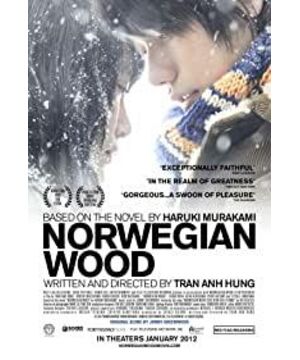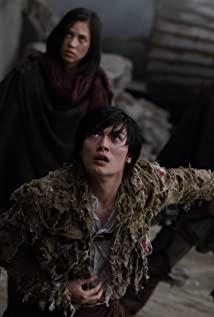Haruki Murakami chose Vietnam-born director Chen Yingying for the film simply because "he is neither Japanese nor American."
Perhaps, he wanted the director to tell the story free of cultural prejudice. Because this is not an erotic movie, but a memoir of a Japanese youth in the 1960s. He tells the story of the growth of Japanese young people in that era when Western culture was invaded.
at the beginning of the story. The middle-aged Watanabe, the long-lost melody heard in the cabin, remembered something in the past. Numerous thoughts gradually unfolded with this "Norwegian Forest". The scenes that appeared in his mind gradually made him sad and unable to control himself.
In Watanabe's memory, "Norwegian Wood" represents not a beautiful forest, but a dead place where the soul is imprisoned.
The director has already devoured the original. The beautiful mountain scenery is so dark, dignified and lifeless in his lens. The eerie and eerie soundtrack interprets the world in Watanabe's eyes. Seeing the green mountains and fields on the screen, we can't hear the birds singing happily, nor can we imagine the breeze blowing in the valley, mixed with the fragrant and cool air of green grass. Because everything has nothing to do with Naoko's world. She was trapped, enclosed in her own world. Watanabe turned out to be just an uninvited guest in Naoko's world.
"She told me to stay and told me to sit wherever I wanted. I looked around and found there wasn't a chair. I just sat on the blanket and spent time drinking her wine. We talked and talked until she said, 'Going to bed!'"
Entering Naoko's world, Watanabe found that Naoko did not leave a chair for himself. So he sat on the carpet and chatted with Naoko for a long time, and they began to fall in love like this, and they began to experience many things together. Although Naoko's heart was not ready for Watanabe's position from beginning to end. In this way, Watanabe's wishful devotion was exchanged for a familiar warmth. It's sad to think about this kind of love.
At the hazy German airport, the sad music once again triggered sad memories, which were continuous and unstoppable. The nostalgic Naoko is the boyhood that Watanabe can't go back to. In this situation, in the eyes of a middle-aged man who is physically and mentally exhausted, it seems like his hometown.
The film "Norwegian Wood" is not highly rated, and most people only regard it as an erotic movie. But after the erotica, what Haruki Murakami wants to write is a confused era and a group of confused and hesitant young people. Let us see how they find their own value in life in an erratic age, and even if they leave the guidance of their predecessors, they still have to grope to start their own life.
The invasion of Western culture, the decline of local culture, and the gradual alienation of the connection between Japanese young people and national culture are the background of this novel. In the novel, traditional Japanese culture is rarely mentioned, but is full of European and American pop music, movies, literature, whisky, and the trend of sexual liberation. I still remember Watanabe's roommate "The Expendables", a well-behaved map student. He is a Japanese youth living in the past, like an alternative. He's simple-minded, simple, a little autistic, a little pedantic, and because of this he gradually became a laughing stock and a bit pitiful at the same time. Until the end of his appearance, he could not understand the unreasonable world in front of him. Between the lines of the author's words, we seem to see his confused and frightened eyes. In fact, the change of the times is such a cruel thing. If they cannot adapt to the environment, they will eventually be eliminated. Later, the author let "The Expendables" disappear from the story for no reason. Also, no one cares about where "he" went, just as no one cares about Japan during World War II, or Japan in the history books. In Watanabe's eyes, the past is nothing but old-fashioned buildings that have not been completely destroyed in the war. They are old, dilapidated, dark, and fragile, and they seem to have lost their meaning of existence.
The character of Naoko suddenly reminded me of an ancient Greek myth for no reason. Roughly speaking, the earliest humans were spherical, with four arms, four legs, a head, and two faces, looking in opposite directions. With extraordinary strength and intelligence, these spherical humans fought the gods, only to be cut in half by jealous gods to cut their power. Since then there have been men and women, the two halves of the original human beings who have been searching for each other, longing to meet again.
The so-called love may be like this. The reason why we want to fall in love is precisely because of our inner weakness. Maybe we feel that it is too difficult to stand in this world by ourselves. Maybe it is because our inner loneliness makes us unbearable. , so longing for someone to enter our inner world. Desire to open up completely and share my whole life with a stranger.
This idea is deceptive.
People who are in love see only their own shadows in the eyes of their lovers, and they are unaware of the complexity and hypocrisy of people. Love comes and goes, entangling his body and mind. Those memories of a better life and future visions have unknowingly been twisted into a dead knot. Enjoying the joy it brings may be less than one-tenth the pain of untying the knot. Love is a beautiful dream that will eventually wake up. Although I feel sad after experiencing disappointment, when I reach a certain age, I will let go of it calmly. Because there will be a full and rich life in front of us, we will naturally understand that love is only an experience in life, not the whole.
But Naoko's life path is different from that of ordinary people. It was precisely when this dream was the deepest and most beautiful that Muyue left without saying goodbye. For an eighteen or nineteen-year-old girl, the knot could no longer be untied. Not only Watanabe can't solve it, but no one can solve it. In this way, this infatuation made Naoko's originally closed inner world even more closed, and the communication with the outside world gradually ended, and finally ended his life in a loss.
The director has a very good grasp of the role, such as Rinko Kikuchi who plays Naoko. The reason why she is outstanding is that her performances always have a taste of true performance. Remember the movie "Tower of Babel", which is a movie about the difficulty of communication between people. Rinko Kikuchi interprets the lonely inner world of a deaf girl very well. Her big, godless eyes, her empty gaze, and the sheer ignorant beauty in her gestures are very impressive. She is especially suitable for playing the taciturn sad girl, such as Naoko. The eyes, the slightly rigid expression, and the style of the lines that speak to themselves, the connection of these key points basically coincides with the reader's impression.
The grasp of the characters in the movie is very well connected with the original book, which is an overlooked success of Chen Yingying. But Yongze's deviation is relatively large. He made Yongze too ordinary, and did not show Yongze's manic, arrogant, lonely, and unbearable side, which made the character somewhat unprovoked contrived.
All in all, as far as the atmosphere of the movie is concerned, my opinion is, it's just right.
Going back to the original novel: This novel describes a young man's helplessness and confusion in the face of growing up, with a kind of sadness that emerges from the cocoon. The unbearable long silence in the film, as well as the tense and eerie soundtrack that is completely out of tune with the beautiful scenery, can completely make the audience feel the lonely and depressed inner world of the characters. In romance movies, this approach fails. But it's really just right in the adaptation of Murakami's works.
Between the lines of the original work, we can feel the author's preference for Midori. Compared with "The Expendables", we will have a more thorough understanding of the image of Midori. Midori is also a traditional Japanese girl at heart. She is filial to her father, thrifty, good at cooking, and refuses premarital sex. Her ups and downs made her deeply appreciate the difficulties of living in this world. To face the world bohemianly, just to fit in, not to be marginalized. In front of Watanabe, Midori is a traditional girl who is gentle and kind. She wants to show Watanabe her vulnerable and real side. She led Watanabe to visit her seriously ill father, hoping that Watanabe could fully accept her life. And in the movie, this is also aptly reflected:
In the original novel, the ending is very abrupt: "I raised my face with the receiver and quickly looked around the phone booth. Where am I now? I don't know where this is, and I have no idea. Where is this place? It's not men and women who don't know where to go. I'm in the middle of a place where I'm not, and I keep calling Midori."
The meaning of this passage is that in Watanabe's life, the journey accompanied by Naoko has ended, and Midori will come to pick him up and enter the adult world.
Novels and movies have a common style: an attempt to present the feeling of deja vu that each of us has experienced at one point or another. It is a story about love, confusion and growth. Encountering, separating, gaining, and losing, we watch how these fledgling young people reshape themselves in love, and then how to stand up staggeringly to welcome a new life.
Du Zhong: Interior designer, likes to watch movies and read books.
WeChat public account: Eucommia Film Review
View more about Norwegian Wood reviews










